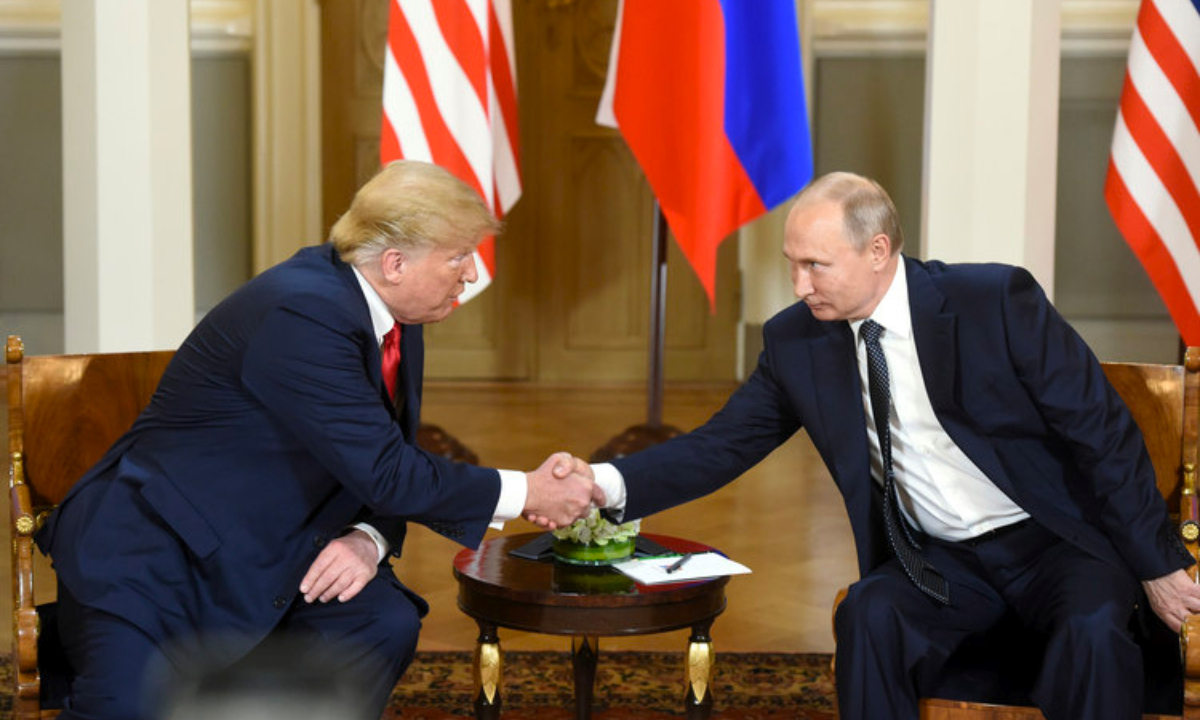Aug 09, 2025, 16:35

File Photo: Donald Trump (L) shakes hands with Vladimir Putin. (Xinhua/Lehtikuva/Heikki Saukkomaa)
(Global Times) Russian President Vladimir Putin and US President Donald Trump will meet in Alaska on August 15, Kremlin aide Yury Ushakov confirmed, according to Russian media outlet TASS.
"The US side has just announced that an agreement has been reached to organize a meeting between Russian President Vladimir Putin and US President Donald Trump on August 15, Friday, in Alaska. Russia and the US are close neighbors, bordering each other. It seems quite logical that our delegation should simply fly across the Bering Strait, and that such an important and long-awaited summit between the leaders of the two countries should be held there," Ushakov said.
Earlier, Trump said he hoped to meet with his Russian counterpart in Alaska on August 15. “The highly anticipated meeting between myself, as President of the United States of America, and President Vladimir Putin, of Russia, will take place next Friday, August 15, 2025, in the Great State of Alaska. Further details to follow,” Trump announced on on Truth Social Friday evening.
This will be their first face-to-face meeting since Trump returned to the White House in January 2025.
Regarding the location, the BBC noted that holding the talks on US territory positions Trump as the host to his Russian counterpart on land that the US purchased from Russia more than a century and a half ago.
The last time Alaska took centre stage in US diplomacy was in March 2021, when President Joe Biden’s newly minted diplomatic and national security team met their Chinese counterparts in Anchorage, BBC said.
From Washington’s perspective, holding the meeting on home soil—Alaska—underscores America’s leading role in mediating the Russia-Ukraine conflict and highlights its proactive position in adjusting US-Russia relations, Li Haidong, a professor at China Foreign Affairs University, told the Global Times on Saturday.
From Trump’s standpoint, choosing Alaska also serves a domestic political purpose – to silence critics within the US who oppose his stance on the Russia-Ukraine conflict and his policies toward Russia. Moreover, Alaska’s geographical proximity to Russia – just a few nautical miles apart across the Bering Strait – underscores that the US and Russia are close neighbors. Contrary to the common perception that the two nations are connected only through Europe, this setting highlights their direct geographic closeness, Li said.
The announcement is being closely followed by global media. The AP wrote that “it could mean a breakthrough in Trump’s effort to end the war, although there’s no guarantee it would stop the fighting since Moscow and Kyiv remain far apart on their conditions for peace.”
Trump’s announcement came on the day he had set as the deadline for Putin to make peace or face severe economic punishment, CNN reported.
Li said that this high-level meeting took place at a critical moment—when US-Russia relations risked spiraling out of control. While the talks may help ease recent bilateral tensions, their impact on resolving the Russia-Ukraine conflict remains uncertain.
Trump’s Friday post made no mention of Ukrainian President Volodymyr Zelenskyy. According to the BBC, there was no reaction from Kiev. The BBC added that “for months, the government of Volodymyr Zelensky has appealed to Washington to give Europe a seat at the negotiating table if the US holds talks with Russia.”
If the leaders reach constructive agreements, translating them into a widely accepted settlement might be fraught with certain obstacles, Li said. Any US-Russia agreement would require Ukraine’s and Europe’s cooperation, yet their reactions remain unpredictable.
US officials, including Trump, have briefed European leaders and Ukrainian officials on a plan offered by Putin to halt the war in exchange for significant territorial concessions by Kiev, according to Western officials cited by CNN.
At the White House, Trump elaborated on what a peace deal with Russia and Ukraine could look like after Putin reportedly presented the administration with a ceasefire proposal involving Ukrainian territorial concessions, the Hill reported.
Cui Heng, a scholar at the Shanghai-based China National Institute for SCO International Exchange and Judicial Cooperation, was not optimistic that the summit would yield any real, workable agreement between Trump and Putin.
He told the Global Times that a single summit is unlikely to end a confrontation as deeply entrenched, multilayered, and high-stakes as the Russia-Ukraine war, significantly more coordination will be required.
Following the upcoming Alaska summit, Russia expects the next meeting between Putin and Trump to be held in Russia, Ushakov said Saturday, according to Xinhua News Agency.
Community login






Add a comment